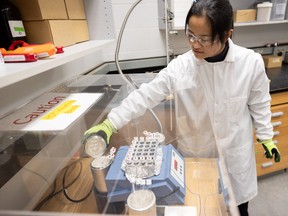'From strength to strength:' Water research hub brings women's voices to the forefront
One fundamental role of the Women Plus Water project is to connect early-career female scientists with mentors who can help them thrive.

Article content
As a scientist focused on water security and water-related health, Dr. Corinne Schuster-Wallace’s career has taken her from her coastal Welsh hometown to melting glaciers in the Rocky Mountains, northern First Nations on long-term boil water advisories to remote areas in sub-Saharan Africa where the nearest source of clean water is a long walk away.
Early in her research, Schuster-Wallace was inspired to think about water in a new way.
“I like to say I ‘came downstream’ to where the people are, because I realized that when we’re studying the snow or the ice melt or the availability of water, the fundamental impact of this is on people,” she recalled. “And I had a mentor, the late Dr. Susan Watt, who challenged me to think about women.”
Now, wherever she goes, Schuster-Wallace meets women whose daily lives revolve around the water their community depends on.
“In rural communities in Kenya, Uganda and Ghana, women and girls have to go and fetch water, and that can take half an hour or more,” she said. “When we’re talking to women, it’s about aches and pains, and the challenges they face during floods or droughts, and the physical violence and animal attacks that women are exposed to because of their role as water fetchers.
“If we bring it back to Canada and to Indigenous communities, there are women like the late Josephine Mandamin, who took it upon herself to walk around the Great Lakes and be a water walker, to draw attention to how precious our water is and how frail it can be, by walking in ceremony around the Great Lakes.”
But when it comes to research, advocacy and policy-making, these same women’s voices are often unheard.
“I’ve had some glaciologists say to me ‘Well, ice isn’t gendered,’ and no, it’s not,” Schuster-Wallace said.
“But the water that melts from the ice goes downstream and gets used by communities in gendered ways. If voices are not at the table, then decisions are made that don’t reflect those needs, and there’s a lot more gendered impact from this research than we might think.”

In 2018, in her role as the associate director of the Global Water Futures research network based out of the University of Saskatchewan, Schuster-Wallace launched the Women Plus Water lecture series.
“This is about shining a spotlight on women and equity-deserving groups in water spaces,” she said.
Through these lectures, scientists, community leaders and experts have shared their knowledge about water as it relates to climate justice, flood plain mapping, public policy, food security and more.
“It’s not just about academic research, it’s also about lived experience, bringing community and professional and private sector and government into these conversations about water,” Schuster-Wallace said. “Since we started, we’ve had over 4,000 people from more than 60 different countries. So it’s been going from strength to strength. And in every conversation we have, there are connections being made.”
For Schuster-Wallace, another fundamental role of the Women Plus Water project is to connect young female scientists with mentors who can help them thrive.
“It struck me that there were a lot of young women who were early-career researchers, who wanted to know not just about the research and the work and the experiences, but how women overcame challenges and decided on the careers they have,” she said.
One of those researchers is Hongxiu Wang, who became interested in water research as a child because of the contaminated groundwater and river water in her home village. Now, she studies the stable isotopes of water, and says the Women Plus Water project has been nothing short of transformative.
“I’ve learned about the strengths women can bring to water research, and I’ve learned more about so many women across the world working on water science,” she said.
“They’ve shared their experiences and their efforts, which inspires me to contribute to this research myself.”
The Saskatoon StarPhoenix has created an Afternoon Headlines newsletter that can be delivered daily to your inbox so you are up to date with the most vital news of the day. Click here to subscribe.
With some online platforms blocking access to the journalism upon which you depend, our website is your destination for up-to-the-minute news, so make sure to bookmark TheStarPhoenix.com and sign up for our newsletters so we can keep you informed. Click here to subscribe.








Postmedia is committed to maintaining a lively but civil forum for discussion. Please keep comments relevant and respectful. Comments may take up to an hour to appear on the site. You will receive an email if there is a reply to your comment, an update to a thread you follow or if a user you follow comments. Visit our Community Guidelines for more information.